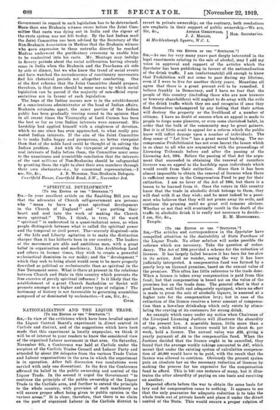" SPIRITEAL DEVELOPMENT."
(To THE EDITOR OF THE " SPECTATOR.") SIR,—In your excellent article on the Enabling Bill you say that the advocates of Church self-government are persons who " mean to have a great spiritual development in the Church of England" and " are putting their heart and soul into the work of making the Church more spiritual." This, I think, is true, if the word " spiritual " is understood in a quasi-technical sense, as when people distinguish between what is called the spiritual power and the temporal or civil power. The—scarcely disguised—aim of the Life and Liberty agitation is to make the distinction sharper than it has hitherto been in our country. The leaders of the movement are able and ambitious men, with a great belief in organization and machinery. Like Archbishop Laud and others in former times, they wish to create a powerful -ecclesiastical dominion in our midst; and the " development " which they seek to bring about would seem to be more properly described as political or ecclesiocratic than as spiritual in the New Testament sense. What is there at present in the relations between Church and State in this country which prevents the free exercise of purely spiritual influence ? Is it likely that the establishment of a great Church Sanhedrim or Soviet will promote amongst us a higher and purer type of religion ? The testimony of history is not favourable to governing assemblies composed of or dominated by ecclesiastics.—I am, Sir, &c.,






































 Previous page
Previous page